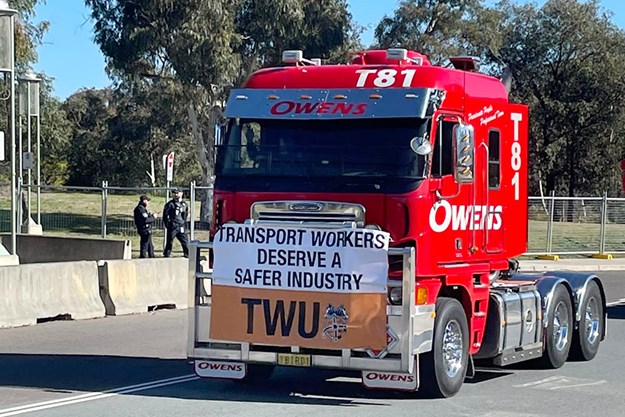Union says convoys highlight the need for independent body to lift standards
In a united industry push for life-saving transport reform, truck drivers, couriers, gig workers, transport employers and transport associations joined convoys from Sydney to Canberra and in capital cities across the country on July 30.
The Transport Workers Union (TWU) says more than 50 transport workers have been killed on the job since August last year, when a Senate report was tabled setting out 10 recommendations including for the Federal Government to establish an independent body to set universal, binding standards.
TWU national secretary Michael Kaine says it’s never been harder for transport workers to safely make a decent living.
“With wealthy clients at the top of supply chains squeezing transport costs and exploitative gig models infiltrating more of the transport industry, companies are under pressure to follow suit or risk being pushed out of the market.
That’s a deadly recipe, and it’s why some unexpected allies have come together to call for life-saving transport reform.
Major operators, employer associations and even Uber have linked arms with the TWU to call for urgent action to level the playing field and make transport safer and more sustainable,” Kaine says.
“With the growing Amazon Effect threatening businesses, wages and lives on our roads, workers and industry groups are convoying across the country today to remind the Federal Government that a body to set safe standards in transport can’t wait.”
RELATED ARTICLE: TWU, NRFA and ARTIO welcome Federal Election result
Over 100 vehicles took part in the convoy to Parliament House in Canberra, while local convoys passed state parliaments in Melbourne, Brisbane, Adelaide and Perth.
As well as the TWU, the Australian Road Transport Industrial Organisation (ARTIO), National Road Freighters Association (NRFA) and major operators ACFS and FBT Transwest stood shoulder to shoulder with workers to call for reform.
ARTIO Secretary Peter Anderson says transport companies who’ve kept this country moving for years are stuck between a rock and a hard place under pressure to slash costs to compete in an unbalanced, unfair, and unsafe market.
“We need urgent reform to provide a safety net for everyone and return healthy competition to one of Australia’s most essential industries.”
NRFA president Rod Hannifey says the association joined the convoy to Canberra to show that the industry is united behind reform and to call for urgent action on the 10 recommendations of a detailed Senate Report tabled last year.
“Truck drivers and truck companies share the same concerns about the current crisis in transport. The industry is at breaking point and everyone is feeling it. That’s why we’ve come together for change,” Hannifey says.
The TWU says the action was to demonstrate extensive industry support and call for all parliamentarians to back a standard-setting body. Industry is calling for urgent action from the Federal Government to guard against the Amazon Effect making transport deadlier.
The convoys coincided with FedEx’s attempts to bring in an underclass of drivers, akin to exploitative gig company Amazon Flex, who will use their own cars or vans on piece rates at just $2.50 per parcel, according to the TWU.
FBT Transwest managing director Cameron Dunn was another to support the protests.
“The Federal Government must act to ensure all parts of the supply chain are accountable so that good businesses like mine which values and protects its workforce can continue doing so.”
ACFS managing director and CEO Arthur Tzaneros echoed Dunn’s remarks.
“Employers and workers in transport supply chains are alike – we’re all feeling the same pressure. We have the Amazon Effect delivering below minimum wages and conditions that don’t exist as they would at traditional operators,” Tzaneros says.
“Unregulated business models like AmazonFlex are having a devastating effect on wages, conditions, safety and sustainability. We urgently need the Federal Government to act on a standard-setting body.”
The TWU says drivers under the AmazonFlex system would be expected to deliver an astronomical 93 parcels in a 10-hour shift – or one every 6 minutes – just to earn $35 an hour before vehicle, fuel and insurance costs and without superannuation, sick leave or protection from unfair dismissal.



